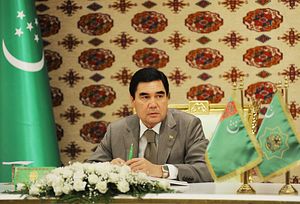European leaders have visited Turkmenistan with impressive frequency in recent years, their only aim to bring natural gas back west. The crisis with and within Russia has prompted Brussels to diversify its sources of hydrocarbons, while trying to reduce carbon emissions. The latest trip to Ashgabat and the subsequent official visit of Turkmen president Gurbanguly Berdimuhamedow to Austria may bring years of negotiations to fruition.
EU Energy Commissioner, Maros Sefcovic visited Turkmenistan at the beginning of May. Sefcovic underscored the mutual interest between the two subjects, aiming at diversifying both export and import options. The most notable quote from Sefcovic’s trip was reported by Reuters: “Europe expects supplies of Turkmen gas to begin by 2019.” This is the first time the EU has put a date on what has traditionally been regarded as a pipe dream. For years, Brussels has sought to convince Turkmenistan, Azerbaijan, and energy companies to build a pipeline across the Caspian seabed between Turkmenbashi and Baku. The chief resistance to this option came from other Caspian littoral countries, such as Russia and Iran, which were still unconvinced about the legal status of the Caspian. With the prospective easing of Western sanctions towards Iran and with the relationship with Russia still strained, Europe can now rethink its diversification strategy.
Turkmenistan and Russia have also had a rocky history with natural gas. Turkmen gas delivered through the main, Soviet-era pipeline across Central Asia has been flowing to Europe through Russian territory with the complacency of Gazprom for a couple of decades with just a few interruptions. Last year, however, Gazprom decided to slash imports from Turkmenistan, when the former found itself in a situation of overproduction. The usual 11 billion cubic meters became 4, and that number is projected to plummet to zero in the next years. Most Turkmen gas is therefore now shipped to China, from the giant fields in the south-east of the country through Uzbekistan and Kazakhstan. China receives 30bcm every year and is poised to augment its imports to around 55bcm as soon as the pipeline reaches full capacity.
This puts Turkmenistan at risk again. After a long period of full dependency on Russia for its exports to Europe, now almost all of its gas is in the hands of Beijing. Shipping gas to Europe by exploiting the 2013 breakthrough in the negotiations of the Southern Gas Corridor may now become feasible given improved relations between the West and Iran. A pipeline through Iran, traveling north to Azerbaijan, and then connecting to the TANAP-TAP network would give Turkmenistan direct access to European markets.
Recently, Turkmenistan had also made news as the source of a revived pipeline through Afghanistan and Pakistan to India (TAPI). The project, first conceived in the Nineties, is deemed feasible again, as the political situation in the countries involved begins to normalize. The realization of this project, along with the others, would multiply Turkmenistan’s commitments towards all cardinal points.
Surprisingly, Berdimuhamedow announced the construction of an East-West pipeline connecting the main gas fields in the south-west with Turkmenbashi, the largest urban center on the Caspian shores of Turkmenistan. The move could shift the balance again towards a trans-Caspian link, although there is little doubt that Russia will veto such a development.
Either way, Turkmenistan now faces decisions. Sefcovic implied that the ball is now in Berdimuhamedow’s court, as Turkmenistan needs to move forward with the political decisions necessary to bring its natural gas to Europe. The EU plan is to build all pipelines on its borders by 2020. The hectic pace at which news are coming out of Turkmenistan is a sign that a link is in the works. The bold European move is certainly anticipating other competitors in the race to gain access to Turkmenistan’s gas riches.

































